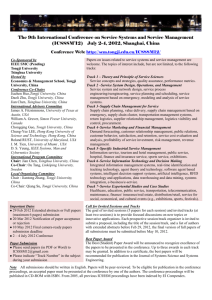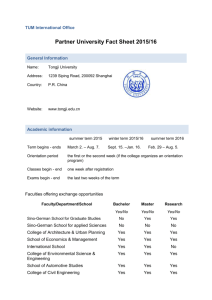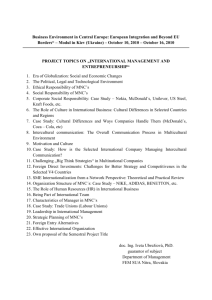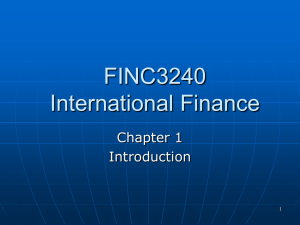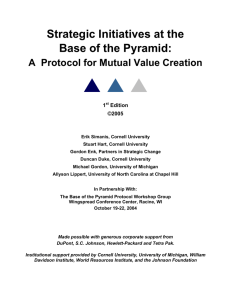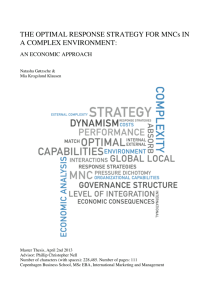Course outline
advertisement
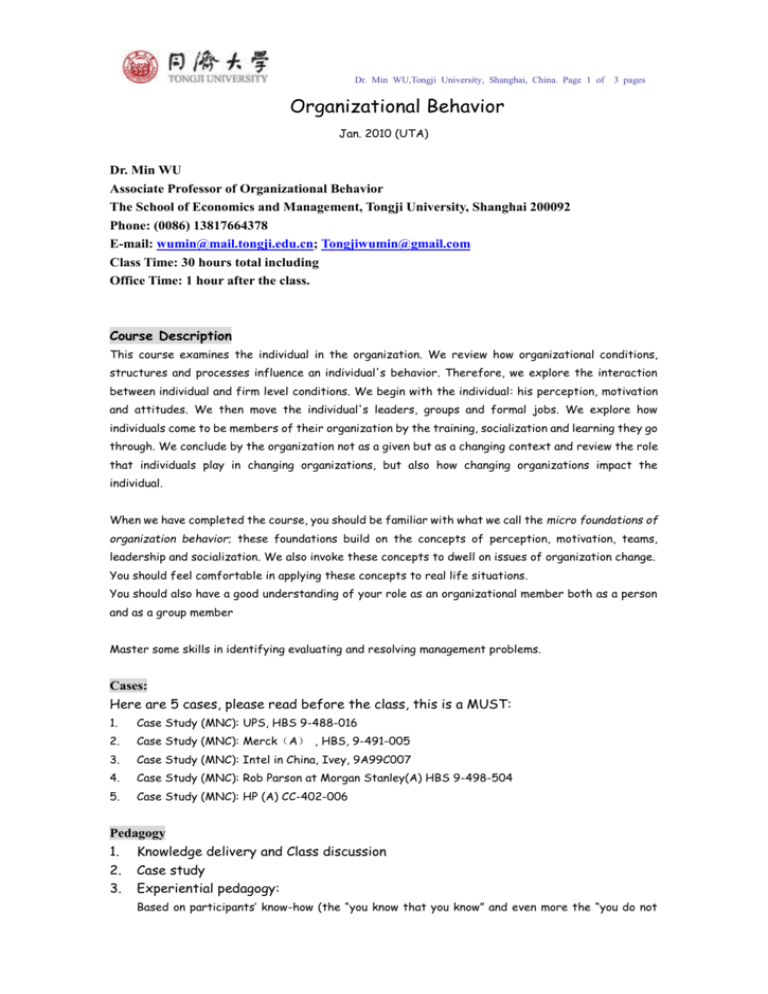
Dr. Min WU,Tongji University, Shanghai, China. Page 1 of 3 pages Organizational Behavior Jan. 2010 (UTA) Dr. Min WU Associate Professor of Organizational Behavior The School of Economics and Management, Tongji University, Shanghai 200092 Phone: (0086) 13817664378 E-mail: wumin@mail.tongji.edu.cn; Tongjiwumin@gmail.com Class Time: 30 hours total including Office Time: 1 hour after the class. Course Description This course examines the individual in the organization. We review how organizational conditions, structures and processes influence an individual's behavior. Therefore, we explore the interaction between individual and firm level conditions. We begin with the individual: his perception, motivation and attitudes. We then move the individual's leaders, groups and formal jobs. We explore how individuals come to be members of their organization by the training, socialization and learning they go through. We conclude by the organization not as a given but as a changing context and review the role that individuals play in changing organizations, but also how changing organizations impact the individual. When we have completed the course, you should be familiar with what we call the micro foundations of organization behavior; these foundations build on the concepts of perception, motivation, teams, leadership and socialization. We also invoke these concepts to dwell on issues of organization change. You should feel comfortable in applying these concepts to real life situations. You should also have a good understanding of your role as an organizational member both as a person and as a group member Master some skills in identifying evaluating and resolving management problems. Cases: Here are 5 cases, please read before the class, this is a MUST: 1. Case Study (MNC): UPS, HBS 9-488-016 2. Case Study (MNC): Merck(A) , HBS, 9-491-005 3. Case Study (MNC): Intel in China, Ivey, 9A99C007 4. Case Study (MNC): Rob Parson at Morgan Stanley(A) HBS 9-498-504 5. Case Study (MNC): HP (A) CC-402-006 Pedagogy 1. 2. 3. Knowledge delivery and Class discussion Case study Experiential pedagogy: Based on participants’ know-how (the “you know that you know” and even more the “you do not Dr. Min WU,Tongji University, Shanghai, China. Page 2 of 3 pages know that you know”), to see how all the theories could be applied to solve a managerial problem in multicultural context. Credits 1 Contact Hours 30 Course Requirements Policy on attendance and participation: Since most class meetings will include the discussion, students are expected to attend and participate in all classes. Feedback: Any feedback, whether verbally or electronically, on anything that concerns you is always appreciated. Preparation: Students are requested to read all the 5 cases PRIOR to the relevant classes. Grading and expectations: Grades will be assigned based on the following weightings: Team Project (80%) Each group will report the findings of a project that was carried out in a real firm. The problem to be addressed has to be germane to this course. Apart from your findings regarding issue identification, evaluation and solution (not compulsory, you will get 2 more pages if offer the solution), you should also indicate the source of your data (which should include an interview with at least three people) company documents, internet sources, and library research. Paper should NOT exceed 5 pages (1250 words), including appendices, tables and bibliography. Again, this report should be signed by all members of the team. Class participation (20%) The course requires a great deal of student involvement. Missing more than 3 classes will make it hard on you to get a better than C grade. Each class period will include discussion, activities, write-ups, or exercises that will require students to be in class and prepared. Your grade will hinge on the quality of your comments in class, your ability to add to class discussion and your input in your team. Teaching Materials: You will get Slides and Cases one month in advance. Dr. Min WU,Tongji University, Shanghai, China. Page 3 of 3 pages Course Schedule (UTA) 9:00-12:00AM, 1:30-6:00PM. Organizational Behavior Course title Instructor Dr. Min WU, Associate Professor of Organizational Behavior Institution Tongji University, Shanghai, 200092, Requirement All students are requested to read all the cases PRIOR to every Meeting. P.R. China Contents, Topics, Activities, Working Meetings (in English) Session 1 Warm-up Behavior Science & Management Session 2 Group Dynamics and Social Influence Session 3 Institutional System, Organizational Culture and Leadership Session 4 Case discussion: UPS Merck Emerson Debriefing /Open Discussion: Students’ Topics Session 5 Motivation Session 6 Power structure and Politics inside Organization Case discussion: SAS Intel Debriefing /Open Discussion: Students’ Topics Session 7 As an International manager in Global Arena Team work Change management Case discussion: Philips in China HP in 1960s HP in 1990s Debriefing /Open Discussion: Students’ Topics Session 8 Questions & Answers Wrap up Deadline for Final Report Feb. 25th

